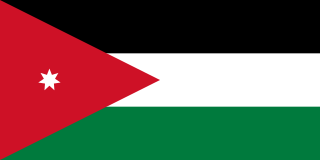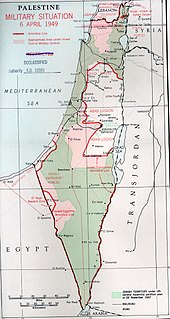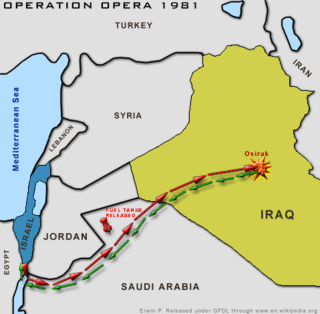| UN Security Council Resolution 228 | |
|---|---|
Israel (green) and Jordan (orange) | |
| Date | November 25 1966 |
| Meeting no. | 1328 |
| Subject | The Palestine Question |
Voting summary | 14 voted for None voted against 1 abstained |
| Result | Adopted |
| Security Council composition | |
Permanent members | |
Non-permanent members | |
United Nations Security Council Resolution 228, adopted on November 25, 1966, after hearing statements from representatives of Jordan and Israel as well as a report from the Secretary-General U Thant concerning the military action, the Council observed that this incident constituted a large-scale and carefully planned military action against Jordanian territory by the armed forces of Israel.

The United Nations (UN) is an intergovernmental organization tasked with maintaining international peace and security, developing friendly relations among nations, achieving international co-operation, and being a centre for harmonizing the actions of nations. It was established after World War II, with the aim of preventing future wars, and succeeded the ineffective League of Nations. Its headquarters, which are subject to extraterritoriality, are in Manhattan, New York City, and it has other main offices in Geneva, Nairobi, Vienna and The Hague. The organization is financed by assessed and voluntary contributions from its member states. Its objectives include maintaining international peace and security, protecting human rights, delivering humanitarian aid, promoting sustainable development, and upholding international law. The UN is the largest, most familiar, most internationally represented and most powerful intergovernmental organization in the world. At its founding, the UN had 51 member states; there are now 193.

Jordan, officially the Hashemite Kingdom of Jordan, is an Arab country in Western Asia, on the East Bank of the Jordan River. Jordan is bordered by Saudi Arabia to the south and the east, Iraq to the north-east, Syria to the north and Israel and Palestine to the west. The Dead Sea is located along its western borders and the country has a short 26-kilometre (16 mi) coastline on the Red Sea in its extreme south-west, but is otherwise landlocked. Jordan is strategically located at the crossroads of Asia, Africa and Europe. The capital, Amman, is Jordan's most populous city as well as the country's economic, political and cultural centre.

Israel, also known as the State of Israel, is a country in Western Asia, located on the southeastern shore of the Mediterranean Sea and the northern shore of the Red Sea. It has land borders with Lebanon to the north, Syria to the northeast, Jordan on the east, the Palestinian territories of the West Bank and Gaza Strip to the east and west, respectively, and Egypt to the southwest. The country contains geographically diverse features within its relatively small area. Israel's economic and technological center is Tel Aviv, while its seat of government and proclaimed capital is Jerusalem, although the state's sovereignty over Jerusalem has only partial recognition.
Contents
The Council deplored the loss of life and property and censured Israel for this violation of the United Nations Charter and of the General Armistice Agreement. The Council emphasized to Israel that actions of military reprisal cannot be tolerated and that if they are repeated the Council would have to consider further and more effective steps to ensure against them.

The 1949 Armistice Agreements are a set of armistice agreements signed during 1949 between Israel and neighboring Egypt, Lebanon, Jordan, and Syria to formally end the official hostilities of the 1948 Arab–Israeli War, and establish armistice lines between Israeli forces and Jordanian-Iraqi forces, also known as the Green Line.
The resolution passed with 14 votes to none, with one abstention from New Zealand.
Abstention is a term in election procedure for when a participant in a vote either does not go to vote or, in parliamentary procedure, is present during the vote, but does not cast a ballot. Abstention must be contrasted with "blank vote", in which a voter casts a ballot willfully made invalid by marking it wrongly or by not marking anything at all. A "blank voter" has voted, although their vote may be considered a spoilt vote, depending on each legislation, while an abstaining voter hasn't voted. Both forms may or may not, depending on the circumstances, be considered to be a protest vote.

New Zealand is a sovereign island country in the southwestern Pacific Ocean. The country geographically comprises two main landmasses—the North Island, and the South Island —and around 600 smaller islands. It has a total land area of 268,000 square kilometres (103,500 sq mi). New Zealand is situated some 2,000 kilometres (1,200 mi) east of Australia across the Tasman Sea and roughly 1,000 kilometres (600 mi) south of the Pacific island areas of New Caledonia, Fiji, and Tonga. Because of its remoteness, it was one of the last lands to be settled by humans. During its long period of isolation, New Zealand developed a distinct biodiversity of animal, fungal, and plant life. The country's varied topography and its sharp mountain peaks, such as the Southern Alps, owe much to the tectonic uplift of land and volcanic eruptions. New Zealand's capital city is Wellington, while its most populous city is Auckland.







